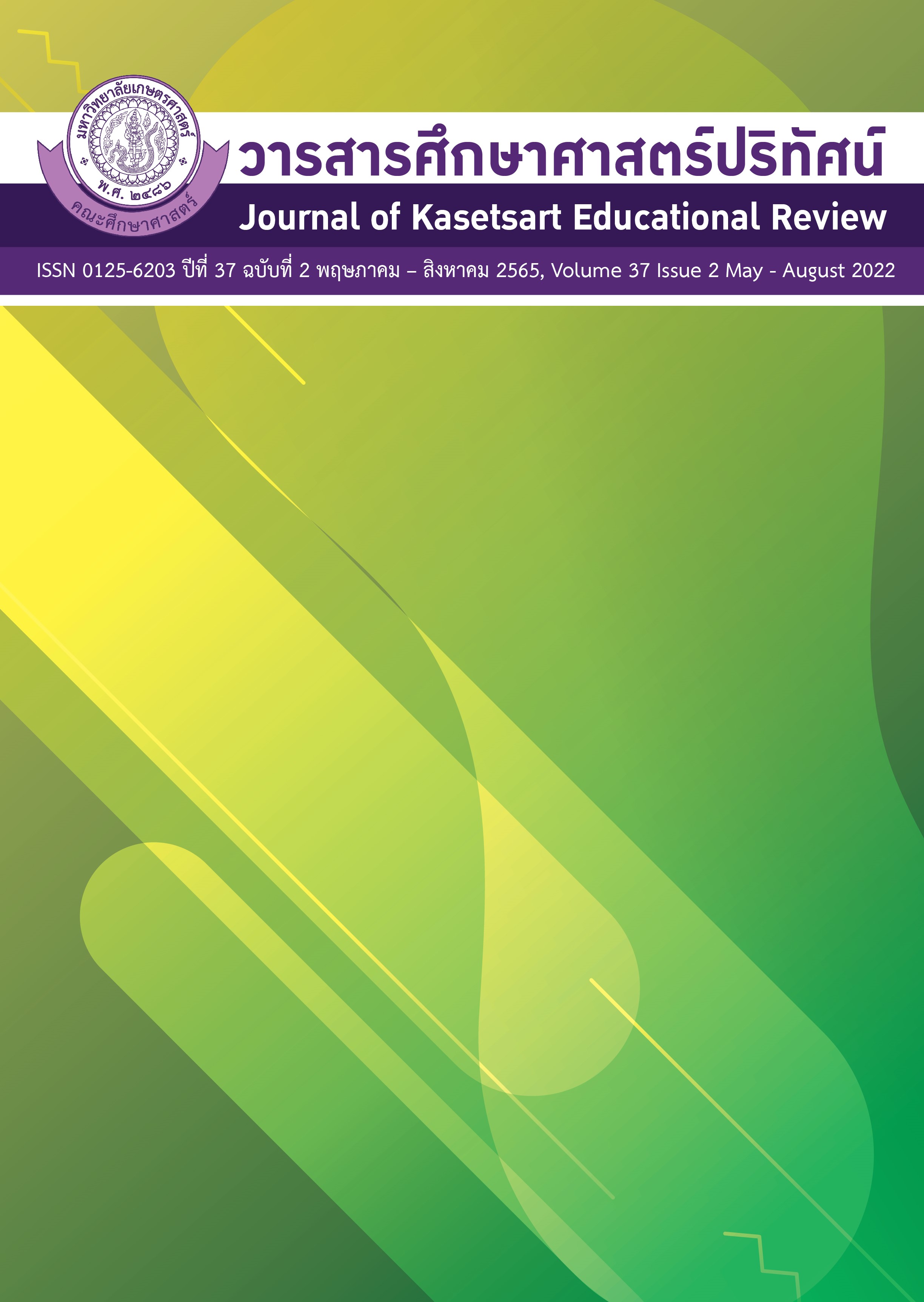การพัฒนาความสามารถในการแก้โจทย์ปัญหาทางคณิตศาสตร์ โดยใช้การจัดกิจกรรม การเรียนรู้แบบใช้ปัญหาเป็นฐานร่วมกับการตั้งปัญหา ของนักเรียนชั้นมัธยมศึกษาปีที่ 4
คำสำคัญ:
ความสามารถในการแก้โจทย์ปัญหาทางคณิตศาสตร์, การเรียนรู้แบบใช้ปัญหาเป็นฐาน, การตั้งปัญหาบทคัดย่อ
การวิจัยครั้งนี้มีวัตถุประสงค์ประสงค์เพื่อ
1) เปรียบเทียบความสามารถในการแก้โจทย์ปัญหาทาง คณิตศาสตร์ในภาพรวมและแยกตามองค์ประกอบย่อยของนักเรียนก่อนและหลังการจัดกิจกรรมการเรียนรู้แบบใช้ปัญหาเป็นฐานร่วมกับการตั้งปัญหา 2) เปรียบเทียบ ความสามารถในการแก้โจทย์ปัญหาทางคณิตศาสตร์ในภาพรวมและแยกตามองค์ประกอบย่อยของนักเรียน ระหว่างกลุ่มที่ได้รับการจัดกิจกรรมการเรียนรู้แบบใช้ ปัญหาเป็นฐานร่วมกับการตั้งปัญหากับกลุ่มที่ได้รับการจัดกิจกรรมการเรียนรู้คณิตศาสตร์แบบปกติ
กลุ่มตัวอย่างใช้ในการวิจัย คือนักเรียนชั้นมัธยมศึกษาปีที่ 4 โรงเรียนบ้านลาดวิทยา จังหวัดเพชรบุรี ภาคเรียนที่ 1 ปีการศึกษา 2563 จำนวน 2 ห้องเรียน จำนวน 69 คน เป็นนักเรียนกลุ่มทดลองจำนวน 35 คน และนักเรียนกลุ่มควบคุมจำนวน 34 คน โดยใช้เทคนิคการสุ่มตัวอย่างแบบกลุ่ม เครื่องมือที่ใช้ในการวิจัยได้แก่ 1) แผนการจัดกิจกรรมการเรียนรู้แบบใช้ปัญหาเป็นฐานร่วมกับการตั้งปัญหา 2) แผนการจัดกิจกรรมการเรียนรู้แบบปกติ และ 3) แบบทดสอบวัดความสามารถในการแก้โจทย์ปัญหาทางคณิตศาสตร์ สถิติที่ใช้ในการวิเคราะห์ข้อมูล ได้แก่ ค่าเฉลี่ยเลขคณิต ค่าส่วนเบี่ยงเบนมาตรฐาน และสถิติทดสอบค่าที
ผลการวิจัยพบว่า 1) นักเรียนกลุ่มทดลองที่ได้รับการจัดกิจกรรมการเรียนรู้แบบใช้ปัญหาเป็นฐานร่วมกับการตั้งปัญหา มีความสามารถในการแก้โจทย์ปัญหาทางคณิตศาสตร์ในภาพรวมและแยกตามองค์ประกอบย่อยหลังเรียนสูงกว่าก่อนเรียน อย่างมีนัยสำคัญทางสถิติที่ระดับ .05 2) นักเรียนกลุ่มทดลองที่ได้รับการจัดกิจกรรมการเรียนรู้แบบใช้ปัญหาเป็นฐานร่วมกับการตั้งปัญหามีความสามารถในการแก้โจทย์ปัญหาทางคณิตศาสตร์ในภาพรวมและแยกตามองค์ประกอบย่อย สูงกว่ากลุ่มควบคุมที่ได้รับการจัดกิจกรรมการเรียนรู้คณิตศาสตร์แบบปกติ อย่างมีนัยสำคัญทางสถิติที่ระดับ .05
เอกสารอ้างอิง
Barrows, H. S. (2000). Problem-based learning applied to medical education. Spring- field IL: Southern Illinois University Press.
Boaler, J. (1998). Open and closed mathematics: Student experiences and understandings. Journal for research in mathematics education, 41-62.
Duangprakes, N. (2017). Problem-Based Active Learning Model on Non-formal Education Students’ Academic Competence. Journal of Education, Faculty of Education, Srinakharinwirot University. [in Thai]
English, L. D. a. H., F. (1995). Problem posing in middle-school classrooms. Paper presented at the Annual. Conference of the American Educational Research Association, San Diego, CA.
Khemmani, T. (2011). Pedagogy, knowledge for effective teaching. Bangkok: Chulalongkorn University Press (CUprint). [in Thai]
Mathuros, N. (2018). A Construction of MEQ Test to Evaluate the Ability of Problem Solving on Measurement for Grade 9 students. Master Degree of Education, Faculty of Education, Chiang Mai University. [in Thai]
Ministry of Education. (1999). National Education Act of B.E. 2542(1999) and Amendments(4th National Education Act B.E. 2562(2019). Bangkok : Kurusapa Printing Ladphrao. [in Thai]
Office of the Basic Education Commission. (2017). Indicators and Core Learning Areas of Mathematics (Revised version 2017) The Basic Education Core Curriculum B.E. 2551(A.D. 2008). Bangkok: The agricultural Co-operative Federation of Thailand Press. [in Thai]
Phumee, W. (2012). The Effect of Problem-Based Learning Instruction Activties on Problem Solving Ability and Mathematical Reasoning Ability of Mathayomsuksa II students. Master thesis, Srinakharinwirot University. [in Thai]
Somboonboorana, S. (2013). Problem-based learning questioning or problems in social science. Walailak journal of social sciences. [in Thai]
Stoyanova, E. (2002). Problem posing in mathematics classrooms. In: A. McIntosh & N.
The Institute for the Promotion of Teaching Science and Technology. (2015). Mathematical skills and processes (3rd edition). Bangkok: 3Q media. [in Thai]
Walton, H. J., & Matthews, M. B. (1998). Essentials of problem‐ based learning. Medical education, 23(6), 542-558.
Wongsathonbunrat, W. (2014). The comparison of mathematics problem solving skills on one variable linear equations learning by using problem-based learning and ipst learning handbook for mathayomsuksa 1, the demonstration school of Nakhon Pathom Rajabhat University. Master thesis, Major mathematics education, Department of Mathematics Silpakorn University. [in Thai]
Worapin, K. (2016). Development of an Instructional Process Based on Problem Posing and Heuristics Thinking Approaches to Enhance Mathematics Problem Solving Ability of Lower Secondary School Students. Degree of Doctor of Philosophy Department of Curriculum and Instruction, Faculty of Education, Chulalongkorn University. [in Thai]
ดาวน์โหลด
เผยแพร่แล้ว
ฉบับ
ประเภทบทความ
สัญญาอนุญาต
ลิขสิทธิ์ (c) 2022 วารสารศึกษาศาสตร์ปริทัศน์

อนุญาตภายใต้เงื่อนไข Creative Commons Attribution-NonCommercial-NoDerivatives 4.0 International License.
บทความทุกบทความเป็นลิขสิทธิ์ของวารสารคณะศึกษาศาสตร์ มหาวิทยาลัยเกษตรศาสตร์ วิทยาเขตบางเขน
วารสารศึกษาศาสตร์ปริทัศน์ (Kasetsart Educational Review)






